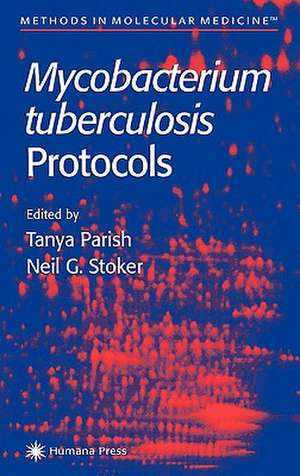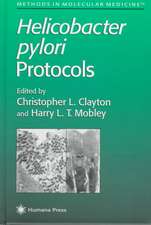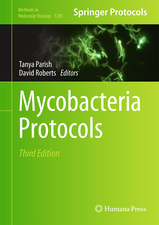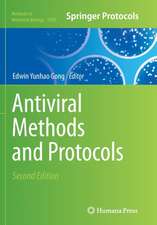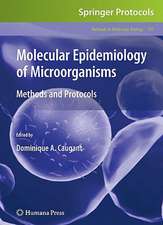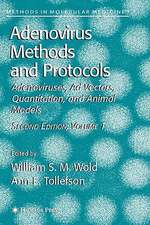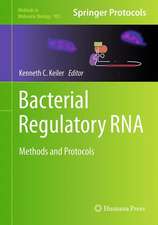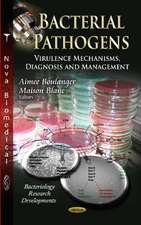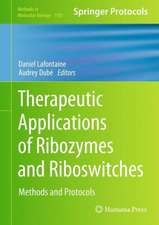Mycobacterium Tuberculosis Protocols: Methods in Molecular Medicine, cartea 54
Editat de Tanya Parish, Neil G. Stokeren Limba Engleză Hardback – 19 mai 2001
| Toate formatele și edițiile | Preț | Express |
|---|---|---|
| Paperback (1) | 786.65 lei 6-8 săpt. | |
| Humana Press Inc. – 9 noi 2010 | 786.65 lei 6-8 săpt. | |
| Hardback (1) | 1109.59 lei 6-8 săpt. | |
| Humana Press Inc. – 19 mai 2001 | 1109.59 lei 6-8 săpt. |
Din seria Methods in Molecular Medicine
- 5%
 Preț: 1278.74 lei
Preț: 1278.74 lei - 15%
 Preț: 655.78 lei
Preț: 655.78 lei - 5%
 Preț: 1106.50 lei
Preț: 1106.50 lei - 5%
 Preț: 727.44 lei
Preț: 727.44 lei - 5%
 Preț: 1108.72 lei
Preț: 1108.72 lei - 15%
 Preț: 650.55 lei
Preț: 650.55 lei - 5%
 Preț: 735.66 lei
Preț: 735.66 lei - 18%
 Preț: 947.35 lei
Preț: 947.35 lei - 18%
 Preț: 948.92 lei
Preț: 948.92 lei - 5%
 Preț: 1114.54 lei
Preț: 1114.54 lei - 5%
 Preț: 1114.91 lei
Preț: 1114.91 lei - 15%
 Preț: 658.55 lei
Preț: 658.55 lei - 5%
 Preț: 734.01 lei
Preț: 734.01 lei - 5%
 Preț: 1111.61 lei
Preț: 1111.61 lei - 5%
 Preț: 1104.32 lei
Preț: 1104.32 lei - 5%
 Preț: 723.21 lei
Preț: 723.21 lei - 5%
 Preț: 1106.13 lei
Preț: 1106.13 lei - 5%
 Preț: 723.05 lei
Preț: 723.05 lei - 5%
 Preț: 1108.35 lei
Preț: 1108.35 lei - 5%
 Preț: 723.42 lei
Preț: 723.42 lei - 5%
 Preț: 1115.65 lei
Preț: 1115.65 lei - 5%
 Preț: 786.86 lei
Preț: 786.86 lei - 5%
 Preț: 1133.01 lei
Preț: 1133.01 lei - 5%
 Preț: 1114.71 lei
Preț: 1114.71 lei
Preț: 1109.59 lei
Preț vechi: 1167.99 lei
-5% Nou
Puncte Express: 1664
Preț estimativ în valută:
212.39€ • 230.78$ • 178.52£
212.39€ • 230.78$ • 178.52£
Carte tipărită la comandă
Livrare economică 21 aprilie-05 mai
Preluare comenzi: 021 569.72.76
Specificații
ISBN-13: 9780896037762
ISBN-10: 0896037762
Pagini: 406
Ilustrații: XIV, 406 p.
Dimensiuni: 155 x 235 x 31 mm
Greutate: 0.8 kg
Ediția:2001
Editura: Humana Press Inc.
Colecția Humana
Seria Methods in Molecular Medicine
Locul publicării:Totowa, NJ, United States
ISBN-10: 0896037762
Pagini: 406
Ilustrații: XIV, 406 p.
Dimensiuni: 155 x 235 x 31 mm
Greutate: 0.8 kg
Ediția:2001
Editura: Humana Press Inc.
Colecția Humana
Seria Methods in Molecular Medicine
Locul publicării:Totowa, NJ, United States
Public țintă
Professional/practitionerCuprins
Plasmid Vectors.- Isolation of DNA from Mycobacterium tubercolosis.- Extraction of RNA from Intracellular Mycobacterium tuberculosis.- Transposon Mutagenesis in Mycobacteria Using Conditionally Replicating Mycobacteriophages.- Gene Replacement and Transposon Delivery Using the Negative Selection Marker sacB.- Gene Replacement using Pretreated DNA.- Gene Replacement in Mycobacterium tuberculosis and Mycobacterium bovis BCG Using rpsL as a Dominant Negative Selectable Marker.- Transcription Start-Site Mapping.- Fluorescence and Brightfield Cytology of Live M. tuberculosis Cells.- Phage Replication Technology for Diagnosis and Drug Susceptibility Testing.- Detection of Mutations in Mycobacterium tuberculosis by a Dot Blot Hybridization Strategy.- Restriction Fragment Length Polymorphism Typing of Mycobacteria.- Preparation of Culture Filtrate Proteins from Mycobacterium tuberculosis.- Analysis of the Capsule of Mycobacterium tuberculosis.- Analysis of the Lipids of Mycobacterium tuberculosis.- In Vitro Model of Hypoxically Induced Nonreplicating Persistence of Mycobacterium tuberculosis.- 17 Macrophage Virulence Assays.- Analysis of Mycobacterium-Infected Macrophages by Immunoelectron Microscopy and Cell Fractionation.- Real Time PCR Using Molecular Beacons.- Electronic Access to Mycobacterium tuberculosis Sequence Data.- Proteomics.- Functional Genomics of Mycobacterium tuberculosis Using DNA Microarrays.- Storage of Mycobacterial Strains.- Safety in the Laboratory.
Recenzii
...a very useful book for the mycobacteria research community. It is a specialist's cookbook, perfect if you want to establish a new method that is outside your scope of expertise. Individual chapters are clearly divided into introduction, materials, methods and an extensive list of notes. -- International Journal of Medical Microbiology
"For those engaged in mycobacterial research (and possibly other unrelated genera) which involves genetics, biochemistry and immunology, this textbook is essential and, moreover, I would recommend it as reading material for students undertaking molecular biology experimentation." -Today's Life Science
"For those engaged in mycobacterial research (and possibly other unrelated genera) which involves genetics, biochemistry and immunology, this textbook is essential and, moreover, I would recommend it as reading material for students undertaking molecular biology experimentation." -Today's Life Science
Textul de pe ultima copertă
With one-third of the world's population infected with Mycobacterium tuberculosis, over two million people a year dying from tuberculosis, and the appearance of multidrug-resistant strains, the need to understand the biology of M. tuberculosis, and so to develop new interventions, has become acute. In Mycobacterium tuberculosis Protocols, leading investigators with extensive practical knowledge and experience describe their best methods for studying this dangerous pathogen. Packed with step-by-step instructions to ensure successful results, these methods range from basic handling techniques to the application of functional genomics. These molecular techniques are suitable for research in genetics, biochemistry, microbiology, cell biology, epidemiology, and diagnostics, and are at the forefront of biological research as a whole, as well as in focused M. tuberculosis research. Highlights include methods for the basic safety and culture of M. tuberculosis, fractionation of the bacterium (nucleic acids, lipids, culture filtrate, and capsule), the analysis of gene expression (start-site mapping, real-time PCR, microarrays, and proteomics), the growth of the bacterium in macrophages and low oxygen, cytological analysis of the bacteria, and diagnostics. Highly practical and accessible, Mycobacterium tuberculosis Protocols utilizes advanced functional genomics and mutagenesis methodologies to provide both experimental and clinical investigators all the powerful techniques needed to illuminate the molecular biology of tuberculosis and its interactions with host cells, and so drive work on the wide variety of emerging therapeutic opportunities.
Caracteristici
Includes supplementary material: sn.pub/extras
